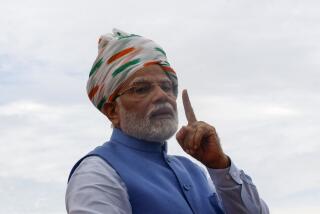British Media Strike Ends as BBC Decides to Show IRA Documentary
- Share via
LONDON — Britain’s first radio and television news strike, held to protest alleged government attempts to censor the broadcast media ended today with an announcement by the British Broadcasting Corp. that it will show a cancelled documentary on the Irish Republican Army in amended form.
At the stroke of midnight Wednesday, broadcast journalists were back on the air, ending the one-day walkout called to protest a BBC decision to comply with a government request to cancel a documentary on the outlawed IRA.
The BBC’s worldwide radio service, which was silenced for the first time in its 58-year history, came back on the airwaves with the call, “This is London.” The BBC transmits news, commentary and entertainment to an estimated 120 million people worldwide in English and 36 other languages.
Shortly before the end of the strike, BBC Director-General Alasdair Milne said the documentary will be shown, but in a revised form.
“The program requires some amendment so that it can be transmitted,” he told reporters. “In due course it will be transmitted.”
BBC officials said a statement will be issued today spelling out more exact plans for the program, which had been cancelled by the board of directors on grounds that it was unbalanced and gave terrorists publicity.
During the strike, a pirate video of the controversial documentary was shown to passers-by on a video cassette recorder on the street outside the BBC’s regional headquarters in Belfast. No trouble was reported.
The dispute directly involved only the BBC, which made the documentary on violence in Ulster, but about 2,000 BBC employees were joined in the anti-censorship protest by hundreds of broadcasters in competing independent television and radio newsrooms.
Only a few regional television and local radio stations around the country kept their news programs on the air.
Most television stations showed old movies in place of news programs. On the radio, there was just music. The BBC world radio service ran taped 30-second messages during scheduled news broadcasts to explain the job action.
Print journalists did not join the protest, however. Newspapers printed as usual, and news hawkers along London’s Fleet Street said they did a brisk trade in afternoon newspapers because of the broadcast news blackout.
Earlier story in Calendar.
More to Read
Sign up for Essential California
The most important California stories and recommendations in your inbox every morning.
You may occasionally receive promotional content from the Los Angeles Times.













